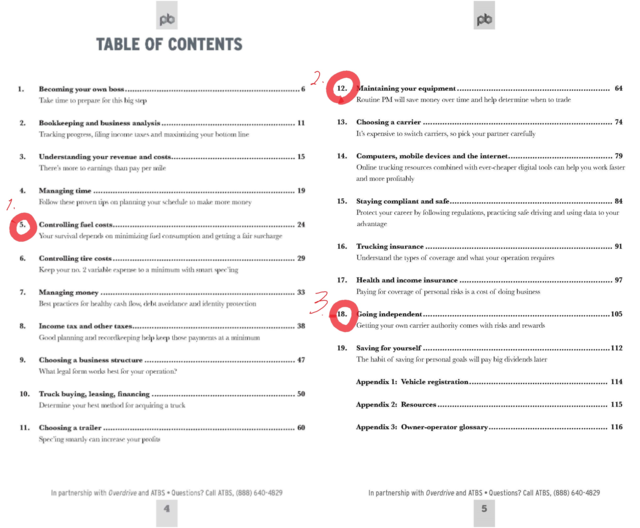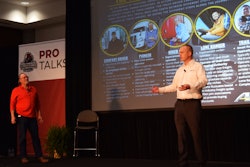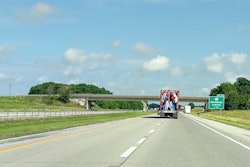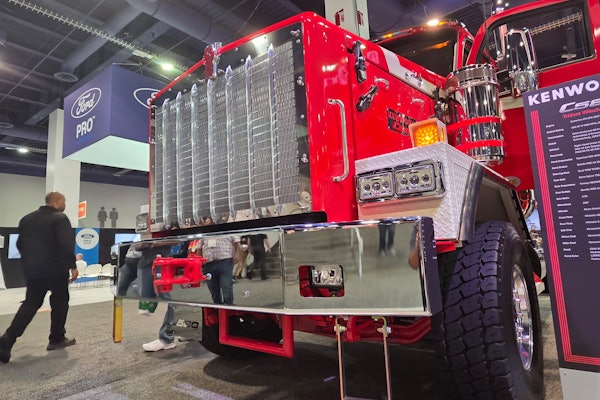"I think the hardest part is changing one's thinking and thought process from company-driver mentality to company-owner mentality. Getting set up and starting is the easy part. It's the follow through that’s hard."
--Bryon Stoll, Suprise Trucking
In my early days as an owner-operator, I was lying to myself every day about how good things were. That was around 2003, and we were just a few years away from the calamity that was 2007-2009 and the Great Recession, when my business’s income, like so many others’ out there, was essentially halved between 2008 and 2009. I have the tax returns to prove it.
Yet by then I’d learned a thing or two and had (well, mostly) stopped lying to myself. I remained profitable in that tough year by being careful about load selection -- I just worked a lot less in 2009, given the availability of loads worth my business’s time was certainly less than ideal, to put it mildly.
All these years later, I’m humbled to have had the opportunity to share the stage with Mike Hosted and ATBS at the Overdrive's Partners in Business event at MATS. ATBS' presentation of benchmark owner-operator cost, revenue and income data, and our commentary, clearly resonated with many in attendance as questions and clarifications continued for a long time afterward with folks in the hall, then with a smaller group. (Stay tuned for other reporting from those talks here on Overdrive.)
A common theme emerged from many conversations with owner-operators both brand-new to the business and well-seasoned: Was trucking as a small business supposed to be this hard?
"I didn't know what I was getting into when I came out here. I have never been a company driver. I have been an owner-operator for nine years, and man it's been a rollercoaster ride for sure. I have made mistakes and learned from them. I am still learning, but improving where needed."
--Owner-operator Dawn Keller

Case in point: While visiting with a vendor, I could sense the fear of the unknown from a couple from near Chicago, who’d made their leap and purchased a used truck. They hadn’t yet hauled a single load, and they were looking for answers to a variety of questions common to all owner-operator businesses, really. Who will you call for advice? Different people and companies have different areas of knowledge, and varying skill levels. Build that support team we’ve all talked about so much.
Support for your business efforts is always going to be needed, and never more so with the market as seemingly unpredictable as it feels today: like we’re on the edge of a cliff with fuel prices, the war in Ukraine, inflation in nearly all costs, you name it. Some in the trade press and outside it predict dramatic economic and freight market recessions. For owners who experienced the ’08/’09 market, the very mention sparks a PTSD-like reaction. Anxiety abounds with any swift fall in rates and freight volumes; worry mounts that newer owners will not be prepared.
[Related: Is a 'freight recession' on the horizon?]
"Be wary of who you got your info from on 'how easy' it was supposed to be! Truckers tell stories, so be sure you get the non-fiction version from those doing it right and not pure fiction from the storytellers!
--Jimmy Nevarez, Angus Transportation
Yet industry surveys of transportation leaders, some detailed in Mike Hosted's presentation, are not so pessimistic as the media prognosticators, necessarily -- for many different reasons than previously experienced by most in management.
There’s a double-edged sword aspect to these “supply chain shortages,” after all. Small trucking in some ways has an advantage when disruptions interfere with the orderly flow of goods and services. The truck owner becomes the hero and is rewarded financially for keeping the flow of essential goods moving. Average profits have increased significantly the last couple of years, as clearly shown in ATBS’ presentation at MATS. Nearly every owner I know can share a story about a load that paid a rate several times greater than ever before, on fewer loaded miles. Yet these loads are the outliers – think of them like a gift. Tread cautiously in thinking you can build your whole business upon the outlier as the foundation.
‘I’ve got 99 problems, but driving the truck isn’t one of them’
"Yes, it was supposed to be hard. If it were easy, anyone could do it. So many enter the industry and they’re immediately taken advantage of by the insurance companies, stealerships, brokers, factoring companies, etc."
--Owner-operator Debbie Desiderato, Walkabout Transport
Remind yourself not to allow what other truck owners are doing to distract you from your plans and goals, because the other side of the supply-chain sword is the shortages that are limiting everyone’s ability to fix problems, hire help, repair and purchase trucks and trailers. What are you going to do about these? When the established companies with millions of dollars in assets and plenty specialized staff find themselves unable to expand, battling the same problems, what chance do you have?
Pessimistic fatalism is an attractive trap in a time like this, but ask yourself: What do I have that others don’t?
Among the biggest problems limiting large fleets currently are the slow-down in truck manufacturing and the reality that, when surveyed, most note that, if they were getting the applications, they would hire every good driver available.
Are you a good driver? If so, you’ve eliminated one of top two barriers to competition, and I’d say that gives you the advantage.
Yet always remember that ignoring a necessary task won’t make its necessity go away. A plan only becomes real when action is taken. How could you kickstart a simple plan? Identify your goal, what action you are going to take, and what the results are when you do. Finally, evaluate.
[Related: Don't let success overshadow the necessity of long- and short-range planning]
I’ve written about this before in the context of what I think of as ongoing, adaptable, shorter-term mini business plans. Writing down what you will do differently tomorrow makes a plan real.
On my way to MATS I asked a truck owner what their goal was for attending the truck show. This seemed to catch them off-balance a little. I suggested to look for a way to solve a problem without spending any money.
One way to do that, potentially: Download Overdrive’s Partners in Business book. Go to the table of contents and prioritize the topics by importance and the problems you may need to address. Set an appointment in your phone as a reminder to open, read and make notes for the goals you need to set or adjust. The only cost you have there is the little bit of time invested.
Whether you’re a new owner or more experienced, the necessity for continuous education and improvements never ends, and the return on this investment with informed decision-making reduces stress that can improve your health and quality of life.
 Identify the goal, determine the actions to take toward completion, record the results and evaluate the effectiveness of your strategies. Whatever the needs of your operation when it comes to refinement, you can download the new Overdrive/ATBS-coproduced Partners in Business manual via this link to start prioritizing.
Identify the goal, determine the actions to take toward completion, record the results and evaluate the effectiveness of your strategies. Whatever the needs of your operation when it comes to refinement, you can download the new Overdrive/ATBS-coproduced Partners in Business manual via this link to start prioritizing.











